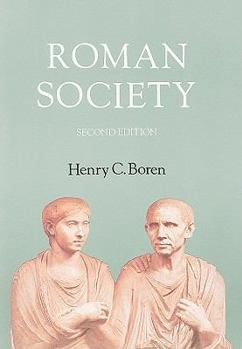Roman Society: A Social, Economic, and Cultural History
Select Format
Select Condition 
Book Overview
Ideal for a one-semester course in Roman civilization or history, Roman Society offers a broad synthesis of the social, economic, and cultural history of this civilization. Topics such as social... This description may be from another edition of this product.
Format:Paperback
Language:English
ISBN:0669178012
ISBN13:9780669178012
Release Date:January 1991
Publisher:D. C. Heath and Co.
Length:338 Pages
Weight:1.50 lbs.
Dimensions:0.7" x 6.3" x 9.1"
Related Subjects
Ancient Education Europe History Instruction Methods Italy Pedagogy Rome Schools & Teaching TextbooksCustomer Reviews
1 rating
Excellent Overview of Roman Social, Economic and Cultural History
Published by Thriftbooks.com User , 17 years ago
Professor Boren takes on the difficult task of explaining the development of Roman political institutions within the framework of social and economic developments that characterized the rise of the Romans from a regional to international power. Tracing the origins of the Roman people as possible refugees from the Trojan War who settled in and around a small backwater village on the Tiber River in Italy through the rise of their economic power and increased rivalry with their Etruscan neighbors, he explains how the Romans' penchant for both the organization and imitation of the positive traits of the peoples around gave them cultural and political advantages over their neighbors and propelled them to become a republic, to defeat first their immediate neighbor, the Etruscans, then the highly organized North African city-state, Carthage. From there, Rome went on to establish itself first as the leading power on the Italian peninsula and with the gradual conquest of lands in every direction from Italy, to become first a regional power and eventually the dominant force in Europe, North Africa and Eastern Asia. Boren explains that it was ongoing rivalry between the ancient landed nobility, the thirty-plus patrician families called the patricians and the emerging economic power of the "new men," new entries into the nobility, of bright and ambitious men such as Cicero and Pompey that led to the eventual downfall of the old republic when the Roman people decided to support economic and political "peace" even at the surrender of their ancient freedoms long guaranteed by a Senate that had become a hollow corrupt shell of the original grand and noble institution it once was. With the advent of the Empire, under Julius Caesar and after his assassination on March 15, 44 B.C, soon under his nephew and "chosen heir," Octavian, who became Caesar Augustus, a long period of political order came to the Rome to be known as the "Pax Romana." During this period a tremendous spurt of both political and economic growth came about. But social and political excesses, corruption, civil wars, pressure from incoming barbarian hordes and the removal of political power from Rome to Constantinople led to the initial decline and eventual fall of Roman power, first in the West with the sacking of Rome by barbarians in 344 and eventually in the East with the fall of Constantinople. Boren makes an excellent case for characterizing the decline of Rome not as some mere "historical accident," but rather as the direct and inevitable result of the decline of the social and political institutions that had once propelled Rome to the world stage. An excellent book that stands on its own as a useful overview of Roman Society and its cultural and political institutions within the context of its history.






